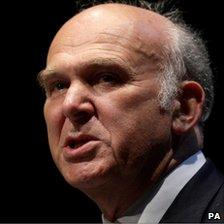Vince Cable ditches graduate tax option for England
- Published

Tuition fees should retain a "progressive" element, Mr Cable says
Vince Cable has admitted the government will not make any move towards a graduate tax to fund universities.
Tory and Lib Dem members are to receive an e-mail explaining the decision in a move that will be seen as preparing the ground for a hike in tuition fees.
Lord Browne's review of fees in England is expected to recommend more than doubling fees to about £7,000 a year.
The business secretary says he is still committed to a "progressive" element within the final fees package.
The Liberal Youth group immediately called on the party's MPs to reject any fee increase.
The National Union of Students (NUS) says it is an "insult to the intelligence" to try to "re-brand" an increase in fees as "progressive".
Election pledge
At the general election, Lib Dem MPs, including party leader Nick Clegg, signed personal pledges that they would vote against any increase in tuition fees.
Now they face the prospect of a major U-turn if the coalition government accepts recommendations for a sharp increase in fees.
There were immediate signs of grassroots opposition to such a change of policy.
The Liberal Youth group says that its supporters will lobby against any fee rise and warned that it would expect Lib Dem MPs to rebel against any attempt to push such a fee hike through Parliament.
Lord Browne's report on university funding is expected to be published on Tuesday.
There are already expectations that it will recommend allowing fees to rise from the current £3,290 per year to £7,000 or more.
The repayments on loans to cover these fees are set to be charged at a higher interest rate than at present - with the expectation that high-earning graduates could be charged at an even higher interest rate.
The Liberal Democrats are pre-empting the report by highlighting such "progressive" measures - in which repayments on loans will be more expensive for graduates in higher-paid jobs.
"I am entirely committed to a progressive system of graduate contributions, the details of which we will be able to confirm shortly," says Mr Cable in his letter.
But he accepts that a graduate tax, which Mr Cable had raised as an alternative funding mechanism but the Tories have always been against, has been effectively ruled out.
"A 'pure' graduate tax - is not the way forward. While it is superficially attractive, an additional tax on graduates fails both the tests of fairness and deficit reduction," he has written in an e-mail sent to Liberal Democrat and Conservative members.
Mr Cable will want to dampen worries within his own party that the coalition government is about to move directly against a key election promise.
Martin Shapland, chair of Liberal Youth, says that any attempt to raise fees would be "against everything the party stood for in the election".
He said that he did not think such a switch in direction would be accepted by the party's MPs.
NUS president Aaron Porter said if the Liberal Democrats were about to attempt such a policy reversal it would represent "an absolute betrayal of the electorate to abandon one of their most popular flagship policies and to sell students out in the process".
"There is nothing fair about extending top-up fees further still and doubling tuition debt. It would be an insult to the intelligence of students and their families to attempt to re-brand the regressive and unpopular top-up fee system,"said Mr Porter.
There have been intense political negotiations around the review of student fees.
Universities, which already face a reduction in budget in the forthcoming spending review, say they are in urgent need of extra funding.
But increasing fees threatens to be a major problem for the Liberal Democrats, who made their opposition to higher fees a flagship election issue.
It will also raise sensitivities for the Conservatives of another squeeze on the middle classes, with the prospect of a three-year degree costing £21,000 or more, plus higher interest repayments on student debt.
- Published15 July 2010